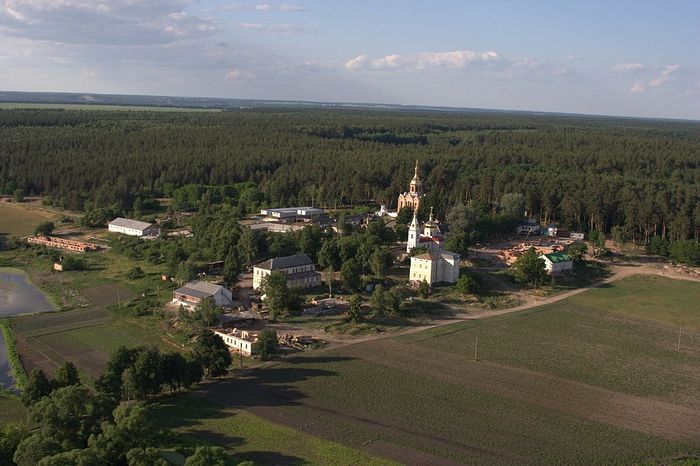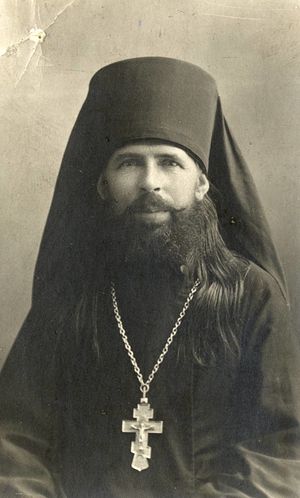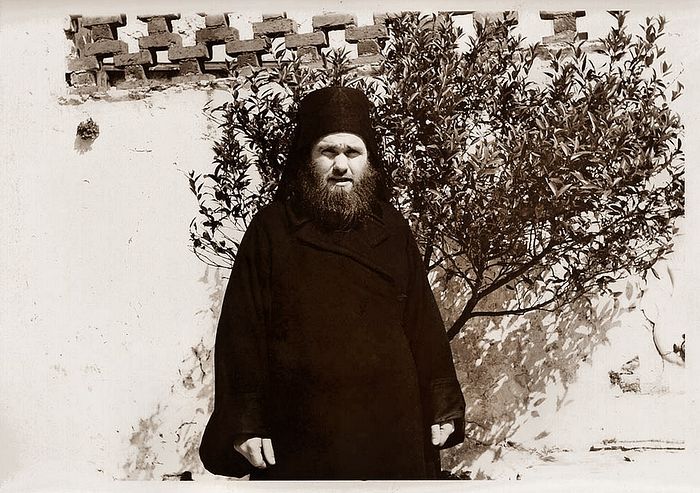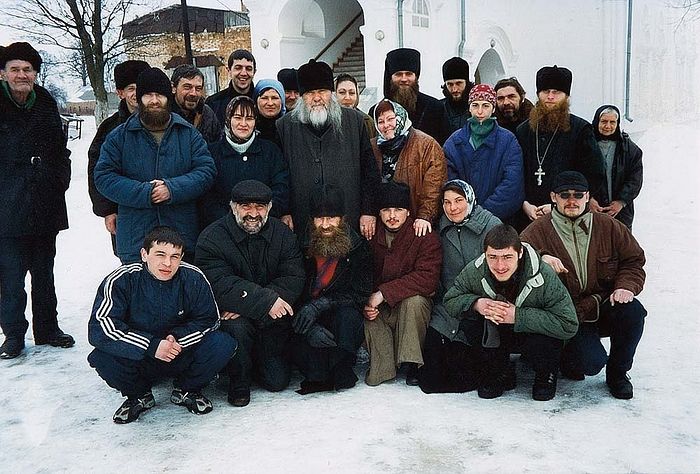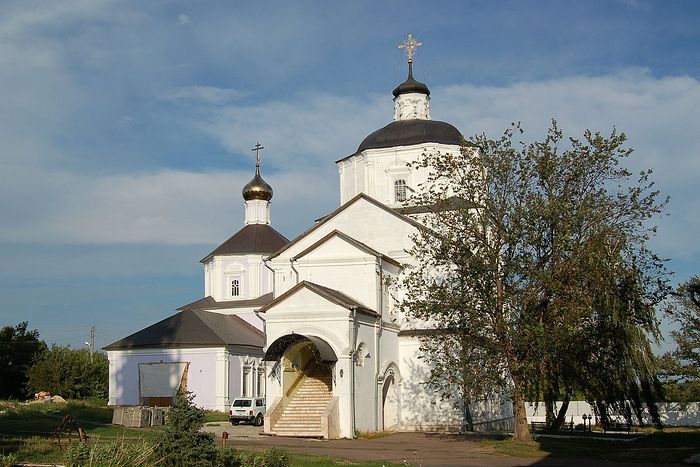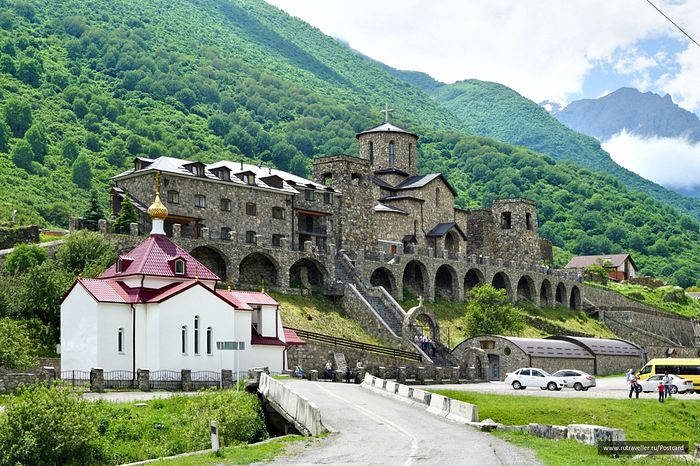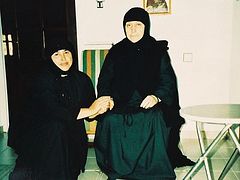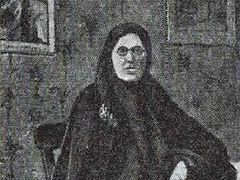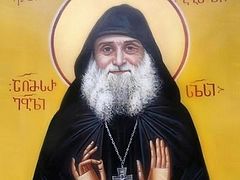In the 1990s, an endless stream of people stretched from all corners of Russia to the Rylsk-St. Nicholas Monastery in the Kursk Province, —they came to resolve their most important issues, for help, and for consolation. The abbot of the monastery at that time was Archimandrite Hippolytus (Khalin, † 2002)—an unusually kind Russian elder who had passed through the spiritual school of Mt. Athos. Schema-Archimandrite Makary (Bolotov) once said of him, “If Russia had a hundred such elders, it would uproot and ascend up to Heaven.”
December 17 is fifteen years since the repose of Elder Hippolytus.
Russian Athonite elder
In the middle of the twentieth century, the existence of Russian monasticism on Mt. Athos was a big question. There were less than ten monks at St. Panteleimon’s Monastery then. The spiritual life there was slowly, but obviously, fading away. The monastery already could have passed over to the Greeks… But in 1966, something happened that literally saved the Russian monastery and allowed it to be reborn. For the first time, the Soviet Union allowed several monks to be delegated to the monastery, which included Archimandrite Hippolytus (Khalin). Arriving a few years later, Schema-Archimandrite Iliy (Nozdrin) said that it was only thanks to these monks that the Athonite monastery was able to be saved.
Sergei Khalin, as the future Archimandrite Hippolytus was known in the world, was the eighth child in the peasant family of Ivan and Evdokia Khalin. He was born in the village of Subbotino in the Kursk Province. His birthday, April 18, 1928, fell on Wednesday of Bright Week. The boy was the youngest child in the family. All three of his brothers died on the front, therefore Sergei had to work hard already in his childhood, helping his parents. However, it did not prevent him from finishing middle school, then studying at a foundry, and a little while later receiving an education at a pedagogical school.
After a brief time of doing highway maintenance work, Sergei was drafted into military service in 1948. As he himself recalls, in the army he would often say the “Our Father” at night under the covers. It is known that Sergei had deep faith in God from his childhood. This was largely due to his uncle Michael who served as a priest. Besides him, the Khalin family had not only priests, but also monks. They recall that in his youth, Sergei had a suitcase full of spiritual books, which he read often, under his bed. He also loved to sing and to learn many poems from Russian poets by heart, which he remembered even into old age.
When, at twenty-nine years old, Sergei found himself at the gates of the Glinsk Hermitage, and then decided to accept monasticism, his parents did not object. Several years later, he joked about himself: “No one wanted to marry me, so I had to go to a monastery.”
Sergei went to the hermitage, hoping to get a blessing for further studies in seminary, but he stayed there as a novice. The fathers said that the monastery would be a seminary and academy for him. The famous elder Schema-Archimandrite Andronik (Lukash) became the young novice’s spiritual father. Many noted that they were remarkably similar, even in temperament and demeanor. It is known that at that time the elder healed Novice Sergei Khalin from severe pneumonia, which could have led to a fatal outcome. This brought them even closer. Once, in his simplicity, Sergei asked his spiritual father who would become the elder after him. “You will,” replied the clairvoyant guide.
From the Glinsk Hermitage, where he spent only one year, Sergei was sent to the Pskov Caves Monastery. There he met Spirit-bearing elders such as Hieroschemamonk Symeon (Zhelnin) and Schemamonk Nikolai (Monakhov). However, the spiritually closest to him was Hieroschemamonk Michael (Pitkevich), who arrived from Valaam in 1957. Sergei became his cell attendant. He was tonsured very soon, then ordained as a hierodeacon and, in 1960, as a hieromonk. Sergei received his monastic name in honor of the Hieromartyr Hippolytus of Rome. He spent six years in Pechory, until 1966, when he was sent to Mt. Athos.
Little has been preserved about Fr. Hippolytus’ life on the Holy Mountain. It is known that he sang on the kliros there and worked in the fields, and today on Mt. Athos there are cedars of Lebanon growing that the elder planted. Batushka also tried to breed chickens, and they really loved him and would walk behind him. Some Greeks would joke, calling Fr. Hippolytus “barefooted,” due to the similarity of the Greek word to his name.[1]
We know that before the canonization of St. Silouan the Athonite, Batushka managed to save the relics of the ascetic, which some monks, doubting the holiness of the venerable monk, wanted to hide in an inaccessible location. It is noteworthy that Fr. Hippolytus lived in the same cell where the saint used to live and pray. Also like St. Silouan the Athonite, he bore the obedience of steward for a long time.
Fr. Hippolytus represented his monastery in the Sacred Community for four years, which witnesses to his high authority among the brethren. It should be noted that Batushka knew the Greek language well, communicating in it freely.
Fr. Hippolytus was very homesick. He often wrote to his friends, “Cherish the fact that you live in Russia. Kiss your land.” He spent eighteen years on the Holy Mountain.
The elder became seriously ill in 1984 and couldn’t stay on Mt. Athos any longer because the local climate was not conducive to his recovery. Thus, Hieromonk Hippolytus found himself at home again, in Russia.
“For forty years I have bowed low to everyone”
From Mt. Athos, Batushka returned at first to Pechory. He was elevated to the rank of archimandrite, and a little later of abbot. In 1986, he was sent to his home Kursk Diocese, where he, as rector, was to rebuild several village churches from ruin. Fr. Hippolytus was sent to the Rylsk-St. Nicholas Monastery in 1991 as abbot. He spent his last eleven years at this monastery. Batushka had to restore the monastery and resurrect the monastic life almost from scratch. One of the most ancient churches in Russia was located then in a dilapidated state.
Father did not immediately manage to get the monastery in order. At first, especially in the first year of his abbacy, Archimandrite Hippolytus even had to hear complaints from the hierarchy because the restoration work was progressing so slowly. Soon, however, a great number of people began to come see the elder. He managed to bring the monastery to a well-kempt appearance, and the monastery’s economic state was greatly improved. Interestingly, Batushka himself never participated in any construction issues. His only activity was prayer. Every day, Fr. Hippolytus processed around the church by himself. There were the people, tools, and materials necessary for construction.
However, the elder did not look for external decoration that was too expensive—he was more interested in what’s on the inside. He belonged to the number of those priests who were not so concerned about the beautification of churches as about the beautification of human souls. Perhaps that is why so many people wanted to see the elder. He had such love and compassion that he could accommodate anyone in his heart—from businessmen to homeless alcoholics. Under Fr. Hippolytus, the monastery was open day and night for all those in need. Sometimes the abbot even had to hear the accusation that he allegedly made a holy place into a “dive.” He had there those who had been convicted, and drug addicts, all rejected by society. Many of them abandoned their former lives, were healed, and received great spiritual help.
The elder possessed an amazing gift of love and consolation. He was also distinguished by his extraordinary meekness and simplicity. The Orthodox bard Evgeny Fokin recalls about Batushka: “His simplicity was such that he could not be otherwise.” But the elder zealously hid all of his spiritual gifts. Many were even perplexed, why such an endless stream of people came to see Fr. Hippolytus. Outwardly, he made no especially vivid impression, and it was nearly impossible to recognize a Spirit-bearing elder in him. Therefore, those who went to the monastery expecting some miracles or prophecies were disappointed.
Batushka never gave homilies; he was not known for eloquence. Generally, he spoke very little and quietly, often inaudibly, so you couldn’t always hear what he said at first—you had to ask him again. He called all men “father.” “Well, how is your salvation, father?” the elder usually asked at the beginning of a conversation. At the end he would say, “Let us pray,” or advise to read the akathist to St. Nicholas the Wonderworker, whom he especially revered.
Once a woman whose son had AIDS, at the advice of her friends, grasping at the last straw, decided to turn to Fr. Hippolytus for help. They traveled from far away. The elder crossed the woman’s son and said, “You have no AIDS.” The whole way back, the woman wept with indignation: “We found a saint, and he doesn’t even know anything; we came so far in vain.” Returning home, her son was examined again, and … they found no disease at all.
But Archimandrite Hippolytus usually helped in another way. He would bless those coming for help to live at the monastery for a while, to do obediences, and to pray. And people would stay: some for a week, some for a few months, some for the rest of their lives. They were saved through prayer and obedience. There were molebens for the sick nearly every day at the monastery, at which even the demon-possessed were healed, and also alcoholics, drug addicts, and others. However, the elder would bless everyone to be present for them, because he believed that “everyone is spiritually sick today.” For these healings, the enemy of mankind took serious revenge on the elder: His face was covered with giant blisters, from which he was delivered only by prolonged nighttime prayer.
Fr. Hippolytus’ inner asceticism was hidden from us, but the fruits of it were evident to all. Bautshka loved to often repeat the Gospel words, The Kingdom of Heaven suffereth violence, and the violent take it by force (Mt. 11:12). Thus he would say, it’s necessary at first to compel ourselves to prayer, and then you won’t be able to live without it, and you will hurry to your prayer rule “as to a date.” To the question of how we should pray, the elder would answer, “With tenderness.”
Batushka’s most important quality was his deep, genuine humility. Once, not long before his death, he mentioned to one pilgrim: “For forty years I have bowed low to everyone.” He never strictly rebuked anyone that came to him—he could only do it softly and indirectly, for example through some song or poem. It was uncharacteristic for Batushka to force anyone or insist upon anything; on the contrary, he always persuaded people, even when he knew exactly what would be the best way to proceed. Perhaps that is why Archimandrite Kirill (Pavlov) once called Fr. Hippolytus “the kindest batushka on Earth.”
Even non-believers would come see the elder, just out of curiosity. Hierodeacon Sergei (Chekhov) of Holy Dormition Monastery in Alanya tells about how the first time he visited the Rylsk Monastery, being an atheist, he considered Fr. Hippolytus some kind of psychic. Batushka noticed him and asked whether he wanted to become a monk. This was, of course, not in the young man’s plans—he was planning to get married in the future. Batushka didn’t insist. But two years later, the young man again showed up at the monastery and stayed as a novice. He was struck by Fr. Hippolytus’ clairvoyance, and other spiritual gifts. “I arrived as an atheist, but the elder took me by the hand, and my world was turned upside down!” he said.
Within a rather short period of time, the abbot managed not only to restore the St. Nicholas Church from ruin, but he also considerably expanded the monastery’s farming. There was work enough for all: There was a lot of land there that needed to be cultivated, and there were animals. For some reason, Batushka especially loved cows, and he milked them himself. They also greatly loved and obeyed him. By the time of Fr. Hippolytus’ repose, the monastery’s herd had about 150 cows.
Besides the rebirth of the spiritual and economic life in the Rylsk Monastery, the elder also founded five sketes in neighboring villages. He especially loved the Kazan Skete in Bolshegneushevo, which today is a convent. Batushka spent much time there in the last months of his life, but it did not limit Archimandrite Hippolytus’ work as a spiritual father: He founded two monasteries in Ossetia—for men in Beslan, and for women in Alagir.
“The apostle of Alanya and the North Caucasus”
It’s not known why Batushka had such special concern for the residents of Ossetia. They themselves even called him “the apostle of Alanya and the North Caucasus.” One man has claimed that the Theotokos herself instructed him to pray for this land. It is obvious that Batushka, endowed with the gift of clairvoyance, foresaw the tragic events that would take place in the Northern Caucasus after his death. He believed that “the Caucasus will be saved only by monasteries.” It can hardly be a coincidence that the Dormition Monastery founded by the elder in Beslan is located just over 200 yards from the school where a famous terrorist act occurred in 2004. A rehabilitation center for children affected by this tragedy was later built in the Alanya convent. Batushka himself specified the spot for building the monasteries in Ossetia.
There’s an interesting story about how the future abbess of the Alagir Monastery, Mother Nona (Bagaeva), and Fr. Hippolytus. Fr. Hippolytus met Natasha (as she was known in the world) when she went to see the elder for work. She was a director for Ossetian television, and she had to film a show on some interesting and well-known personality. Since many Ossetians would go to see the elder, Natasha decided to interview him, but the abbot of the Rylsk Monastery of course could not give an interview. However, in their conversation he asked the young girl, “Do you know that you are a nun?” This made Natalia quite angry, and she wondered how such a thing could be known. “Monastics have a cross shining on their foreheads,” Batushka answered. The girl absolutely did not expect to hear such a “revelation” about herself, but then she was surprised even more. A woman ran into his cell, looking for “Natasha the director,” and the elder said that the abbess of Alanya herself had come to visit him, pointing at “Natasha the director.” She didn’t even know at that point what an abbess is; but a year later she was tonsured in the St. Nicholas Monastery and today heads the Theophany Monastery in Alanya.
Blessed repose
When Batushka had a stroke at the end of 2002, it was a surprise to everyone, but no one thought he would die. Fr. Hippolytus was in an unconscious state for several weeks. Amazingly, when receiving Communion, his swallowing reflex would appear for a time, and then disappear again. The elder departed to the Lord on December 17, and was buried on the 19th, on the day of St. Nicholas the Wonderworker, who was much beloved by him. The spiritual father of the monastery was buried at the altar of the St. Nicholas Church that he had rebuilt. After Batushka’s repose, a miracle was recorded: The cross on his grave began to stream myrrh. It happened on the ninth day. Many have confirmed that the day before, and on the day of his death itself, they saw unusual natural phenomena. But even without that it was obvious to all that the Russian land had found in the person of Archimandrite Hippolytus (Khalin) another intercessor in Heaven.


